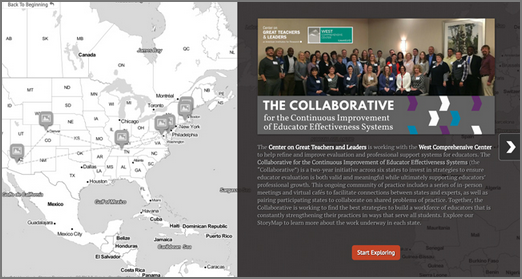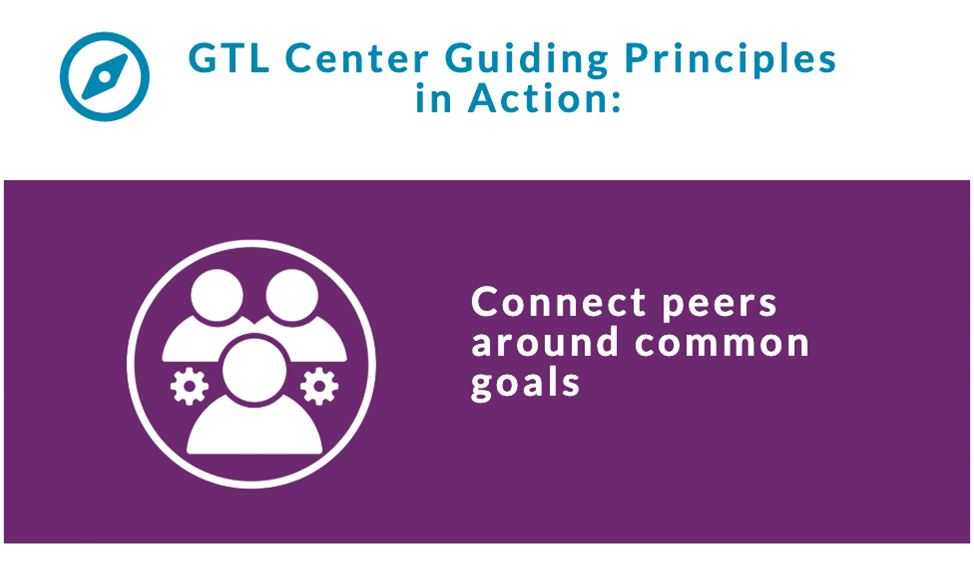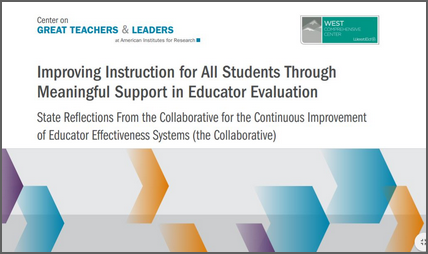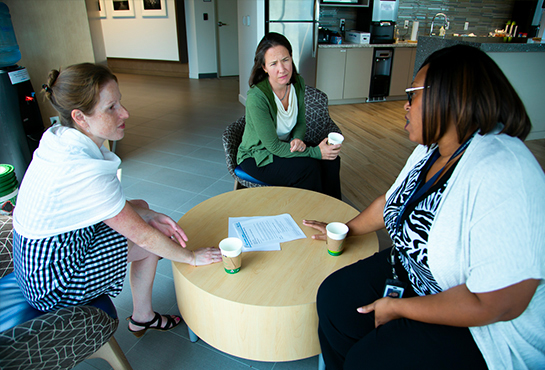Collaborative for the Continuous Improvement of Educator Effectiveness Systems
The Collaborative for the Continuous Improvement of Educator Effectiveness Systems
The Collaborative was a 2-year initiative (2016-2018) that supported Arizona, Colorado, Delaware, Massachusetts, Rhode Island, and Tennessee in investigating ways to improve their educator evaluation and professional support systems. The Collaborative worked to improve educator evaluation systems so that the process
- assesses teacher performance in a valid and meaningful way and
- uses that information to best support educator growth and development.
By refining and improving evaluation and professional support systems, states can build and sustain an educator workforce that is continuously improving their practices in ways that serve all students.
StoryMap: A Quick Look at State Projects in the Collaborative
Looking for a quick, interactive way to learn about each state's Collaborative project? Click through our StoryMap to discover the hard work completed by each team.
The Challenge
In recent decades , many states and districts reformed minimal or compliance-oriented educator evaluation and professional learning systems to improve teaching and learning for all students. The creation of these new systems has led to many changes, including a greater understanding and common language concerning instruction and teachers receiving more frequent feedback on their practice.
The Collaborative states experienced similar benefits but sought to carry on one-step farther and establish a continuous improvement cycle to strengthen their systems’ impact on teacher practice.
The Opportunity
Each state built on what worked within their existing system while recalibrating their models to improve educator practices and to expand the knowledge and skills of educators, both individually and collectively. The states identified a specific problem of practice along with strategies to address this problem, then relied on the Collaborative community to:
- Hone the design and implementation of the strategy
- Consider alignment to the larger state educator effectiveness system
- Monitor progress toward goals and outcomes
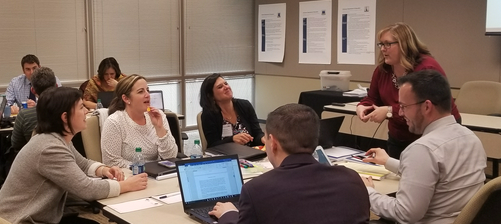
The Approach
The project was led through a partnership of the Center on Great Teachers & Leaders (GTL), the West Comprehensive Center, and six states. The Comprehensive Center partners convened participating states in an ongoing community of practice rooted in a continuous improvement cycle through in-person convenings and virtual cafés that included frequent opportunities for peer-to-peer interaction and consultation, access to experts and emerging research, and recurrent check-ins to reflect upon progress.
Timeline and Assistance Strategies
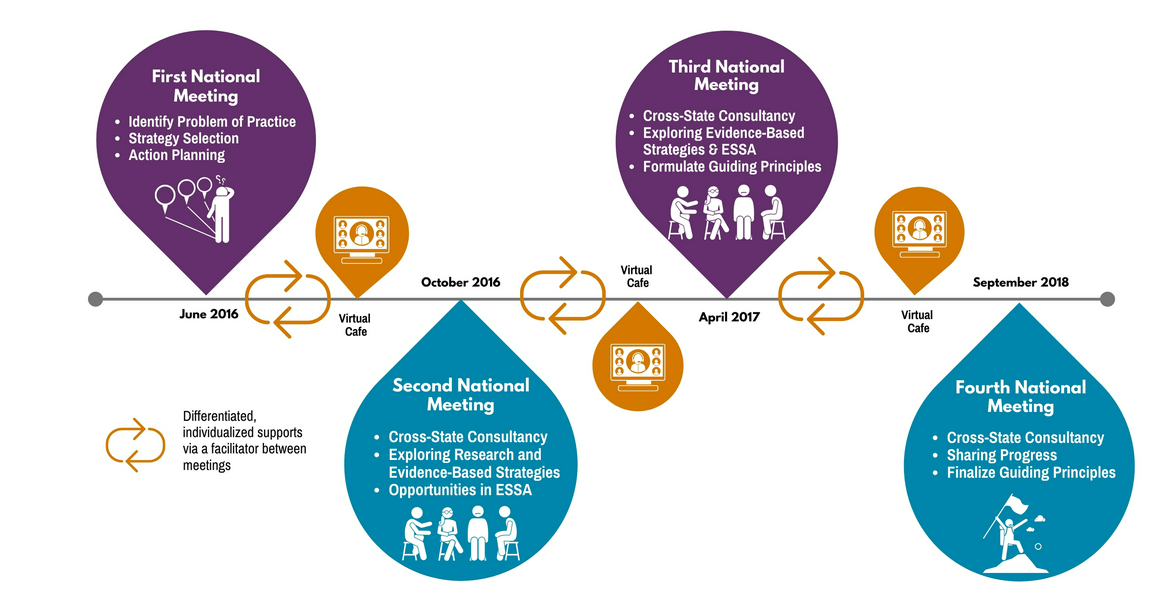
Project Outcomes
As a result of the Collaborative, all six states made policy and practice revisions designed to strengthen existing educator evaluation systems:
- Arizona developed the Qualified Evaluator Academy (QEA) to improve principals’ capacity to conduct observations and provide high-quality feedback to teachers. Learn More >
- Colorado adopted multiple strategies to improve the quality of feedback teachers receive by streamlining their state's evaluation rubric and providing support and coaching on the updated rubric. Learn More >
- Delaware engaged in authentic communication with stakeholders and addressed misconceptions of the educator evaluation system to improve buy-in and implementation. Learn More >
- Massachusetts revised their student growth model to streamline their teacher evaluation system while reinforcing educators' conversations about how instructional practice impacts student learning, Learn More >
- Rhode Island worked closely with stakeholders to develop, pilot, and implement three alternative models for measuring student learning, giving districts greater flexibility, Learn More >
- Tennessee expanded their student growth portfolio model to strengthen feedback to teachers while deprivatizing the culture of teaching and learning, Learn More >
Explore the Collaborative's Six Guiding Principles and read project vignettes that offer inspiration and knowledge for other states and districts interested in stronger systems to support educators.
Educator Effectiveness Systems Assessment
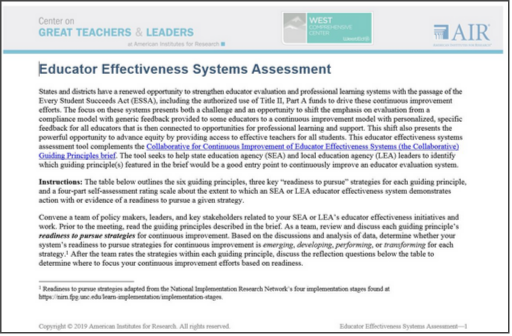
The Collaborative states created a educator effectiveness systems self-assessment tool to help other states and districts identify the best starting point to focus on based on local needs.
Client Perspective
When asked what they saw as the biggest benefit to participating, state agency staff said:
“I think that the biggest benefit to this Collaborative is just to have...like-minded thought partners...to be able to learn from others the challenges, obstacles...and save time to get to solutions more quickly."
“I think that having people who are in like roles check your assumptions, There’s just so few people who do what we do…. We’re constantly getting new ideas."
“Some of the things we were struggling with were pieces that others had already worked on...we were able to avoid some of the pitfalls and struggles...We learned from [their experience and]...saved a tremendous amount of time and effort."
“For us the consultancy protocol was huge...we have really replicated in a lot of ways. It was a really clear structure that was able to...expedite the time that we come together.”


